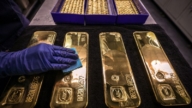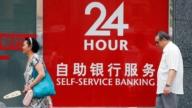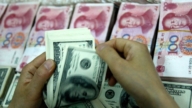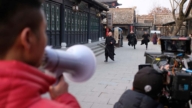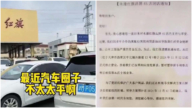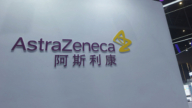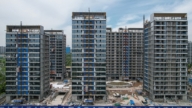【新唐人2012年7月16日讯】大陆的国家统计局7月13号发布资料显示,中国第二季度国内生产总值(GDP)较上年同期增长7.6%,创下2009年第一季度以来的最低水准。不过专家指出,中国的经济实际上要比公布的严重得多,靠投资增长的模式已经走到了尽头。
从7月9号国家统计局公布的月度经济资料显示, 6月份的全国工业生产者出厂价格(PPI)同比下降2.1%,实现连续四个月负增长,降幅不断扩大。不仅如此,6月进口总额超预期的下滑。这反映出目前中国仍“需求疲软”,下半年经济增速或将继续放缓。
虽然如此,仍有不少经济学家怀疑中国实际情况比官方资料更为恶劣。
总部设于伦敦的研究机构“资本经济”为了正确预测中国经济增长,在2008年至2009年度之间自行构建了一套准则:依赖电力生产数字、火车运输流量、地产动工资料,来测量中国的经济动力。
根据“资本经济”的计算显示,中国今年首季的经济增长比官方数字低了半个百分点。
不过,《法国国际广播电台》指出,有些地方领导为了夸大生产数字,同时夸大了“电力生产资料”。
一位不愿具名在大陆研究经济学的郑姓学者,对中国的经济表示了悲观,他预计大陆不久将发生通货滞涨,然后经济通缩。他认为,现在的形势逼人,大家要准备勒紧裤腰带过苦日子。
大陆经济学者郑先生:“我们的统计资料是有问题的,我们的百分之八、百分之十,八点几啊、九点几啊,那些资料,大家都知道怎么来的好了。中国实际的GDP绝对最多百分之五,甚至是百分之三点几。我认为准确一点的,从我得到的有些资料。”
任职北京“首都经济贸易大学”的王先生也认为,未来一两年会比较困难,GDP可能还要小幅度下降。
北京“首都经济贸易大学”王先生:“随着价格的增长,现在好多产业竞争力变得更加弱,实体经济也不是很好,金融有点过度的过渡化,整个的经济现在下行的趋势比较明显。”
为了应对当前危机,“中国人民银行”在6月份连续两次降息。国务院总理温家宝最近也强调:“稳定投资是扩内需、稳增长的关键。”温家宝承认,目前房地产市场调控任务还很艰钜。
旅美经济学家简天伦博士指出,中国经济确实处于两难的境地:过度放缓可能导致经济硬着陆;不加抑制,房地产泡沫还会进一步扩大。
简天伦:“出厂商的价格指数已经连续4个月是负值,基本上说明中国的需求在减弱,也就表明它的经济增长在减弱,出口和进口都在放缓,投资也在放缓,而且在相当大的幅度放缓,所以人民银行才一个月减两次息。”
简天伦表示,连续两次降息说明经济已经出现了很大的问题,但是降息又可能使房地产泡沫进一步恶化。
针对目前政府投资促增长的趋势,学者给予了警告。
“中欧国际商学院”教授许小年在“2012中国绿公司年会”上指出,就是“投资驱动”的传统增长模式,把中国经济拖入今日困境。这种模式已经走到了尽头,并且,政府拉动内需,只是拉动了投资需求,这只能使“产能过剩”问题进一步恶化。
许小年指出,要渡过当前的难关,就必须重振民营经济。
但是,“巨人网路”董事长兼CEO史玉柱12号在他的《新浪》微博上表示,除了垄断企业,现在企业普遍资金匮乏。
分析看来,中国制度不改变,一切由体制带来的问题会越陷越深。
采访/常春 编辑/宋风 后制/周天
China’s Official GDP Data May Be Worse Than Reported
The latest release of China’s National Bureau of Statistics showed 7.6% GDP growth in the 2nd quarter of 2012. This is the lowest level since the first quarter of 2009. However, the reality is much worse than the published data.
The investment-driven growth model has reached the end, commented economic professionals.
China’s official monthly economic data released on July 9 showed a year-on-year drop by 2.1% for the Producer Price Index (PPI) in June 2012. This was negative growth for the 4th consecutive months, along with a growing decline in range. Total imports in June fell more than expected, indicating an “ongoing weak demand” in China. The country’s economy is expected to show a continuous slowdown in the 2nd half of year.
Quite a few economists suspect a worse case scenario exists in reality than the one alleged by China’s official data.
London-based research firm Capital Economics invented its own index during 2008-09 to measure China’s true economy. They rely on electricity production, train traffic flow and the figures of construction projects commencing.
Capital Economics’ proxy indicator apparently showed that China’s economy grew by half a percentage point lower than the official figure in the first quarter of 2012.
The Radio France Internationale (RFI) commented that some local authorities in China were suspected of exaggerating electricity production growth rates.
Mr. Zheng, an anonymous scholar of economics in China thinks pessimisticly about the country’s economy. He forecasts a stagflation will come shortly followed by a deflation. He warns of tough times ahead, given the current
pressing situation.
Mr. Zheng: “The openly available data is not reliable with those figures of 8%, 10% and similar. We all know where these figures came from. The true Gross
Domestic Product (GDP) figure of China doesn’t exceed 5%. More accurately, it could even be a little more than 3%, based on the information I have.”
Mr. Wang from Capital University of Economics & Business thinks that life could be hard in China in the next couple of years. The GDP is expected to continuously decline.
Mr. Wang: “With the price going up, a lot of industries have lost their competitive edge. The real economy is also going through a harsh time. The financial transition went a little overboard. The entire economy now presents with an obvious downward trend."
China’s central bank cut interest rates twice this June. The regime’s Premier Wen Jiabao recently stressed, “Maintaining investment is the key to expand domestic demand and secure the growth." Wen admitted that China’s property market control is a really hot potato.
US-based economist Dr. Jian Tianlun says China’s economy is trapped into a dilemma; Excessive slowdown may lead to an economic hard landing, while the real estate bubble will be further expanded.
Dr. Jian Tianlun: “The PPI data was negative for the 4th month in a row, which means that China’s demand is shrinking. A further substantial slowdown in its economic growth, exports, imports, and investment. That’s why China’s central bank cut interest rates twice
in one month.”
Dr. Jian says that the two interest rates cuts indicated China’s economy has been in big trouble. Also cutting interest rates may lead to further deterioration of the property bubble, he thinks.
Scholars warned China’s official encouragement in boosting investment was to push economic growth.
Professor Xu Xiaonian at China Europe International Business School said in public that today’s economic predicament in China was precisely caused by the traditional “investment driven" growth model. The model has come to an end now, he claimed.
The authorities’ domestic demand stimulation only pulled on the investment demand. This will worsen the issue of overcapacity, he feels.
Prof. Xu proposed to revive the private sector, which is a must for China to get through the existing hardships.
Shi Yuzhu, President and CEO of Giant Interactive, revealed some opinions in his Sina microblog on July 12th. “All enterprises in China are now generally short of capital, excluding monopolies.” he said.
In conclusion, the unchanging establishment in China will only make the resulting problems it created more entrenched.


